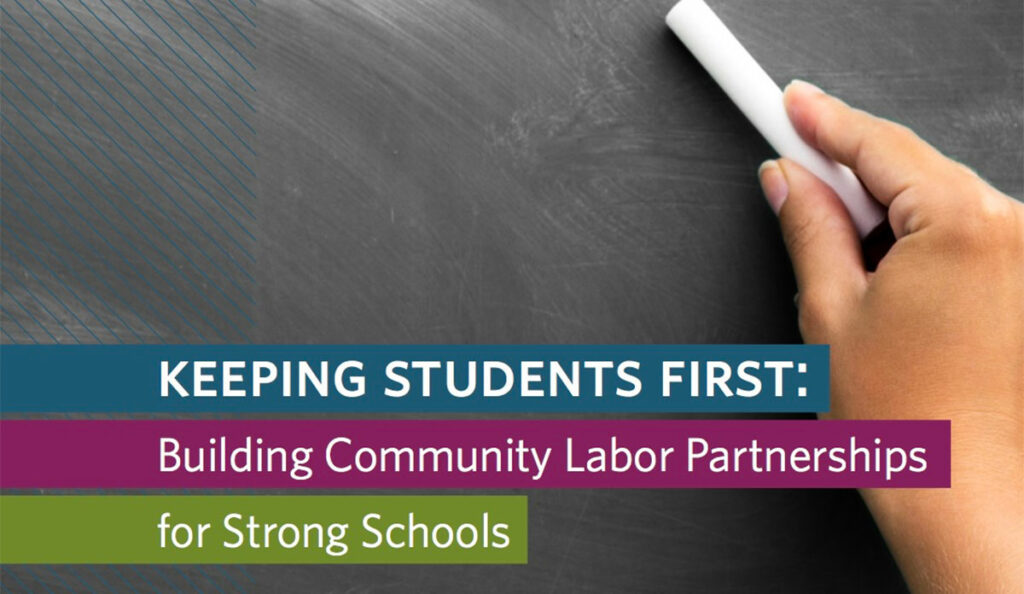Blog
Schott Summer School: Parent Organizing is at the Heart of Education Justice
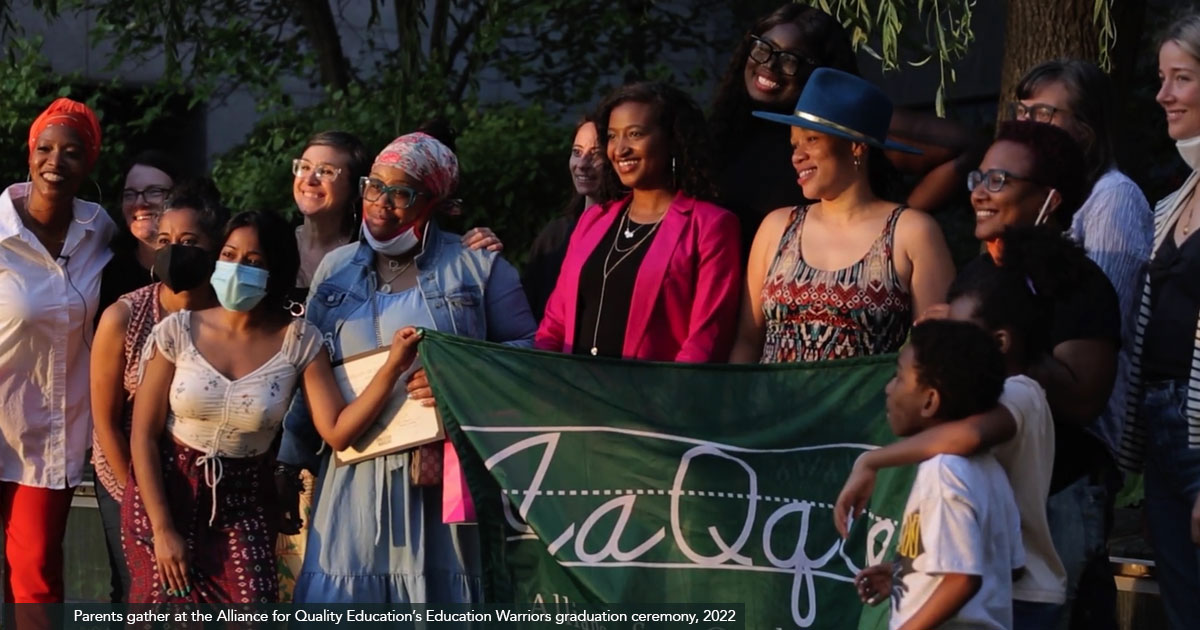
At Schott, parent organizing has been central to our grantmaking strategy from day one. Our grantee partners have been engaging public school parents for decades now, building public and political will for racial justice, equitable school funding, an end to the school-to-prison pipeline, and genuine parent voice in school governance.
But consumers of mainstream media would be forgiven if they thought parent organizing had been invented just a few years ago by the far right. Starting with opposition to COVID-caused school closures and later school board meeting chaos over book bans, Critical Race Theory, and rights for LQBTQ+ students, the picture of parent engagement on TV is a far cry from the serious work that’s taken place across the country over generations.
Groups like Moms for Liberty, which was recently labeled an extremist group by the Southern Poverty Law Center, use the rhetoric of “parental rights” to cover their goal of defunding and privatizing public schools. As Truthout reported last year:
Starting in 2020, existing dark money groups such as the Independent Women’s Forum, which has received funding from the Koch network and the DeVoses along with secret donors, took advantage of parents’ genuine concern over their children’s educational challenges during the COVID-19 pandemic. They used the pandemic to attack public schools for their safety regulations (like masking and temporary virtual learning measures), to scapegoat teachers’ unions, and to peddle the diversion of public tax dollars to privately managed alternatives.
Build bridges over wedges
A common tactic for right-wing politicians and advocates is to drive a wedge between parents and educators, posing classroom teachers as interlopers in the parent-child relationship. This has been a staple of their movement for decades, before even the debates over sex ed and evolution in the 1990s.
This is a challenge that parent organizers can face head on. Not only are educators among the highest regarded professions in the country, parents know that while they want their input valued, they trust educators’ expertise. A 2022 Hart Research poll found that between the two statements “Parents should have more say in what their children are taught in school” and “Teachers and education professionals should determine the school curriculum, with input from parents,” respondents favored the latter by 58-42 percent.
But beyond messaging, it is crucial for parent organizations to build close ties with educators: in coalition spaces, groups can strategize to reach shared goals. These spaces are also where honest and frank conversations can be had on issues over which there may be disagreement, like school discipline reform, and reach common understanding.
In 2018, Schott and Building Movement Project released Keeping Students First: Building Community Labor Partnerships for Strong Schools, an extensive step-by-step guide and toolkit for how to engage in this kind of cross-sector work.
Internal education and training are key
Several Schott grantee partners hold regular family training programs, usually multi-week or multi-month processes in which participants learn more about the education system, the politics around it, the local policy landscape, and the essentials of grassroots organizing.
In New York, the Alliance for Quality Education (AQE) holds a leadership development program called Education Warriors. “Education justice is racial justice,” AQE Executive Director Jasmine Gripper says. “Empowering Black, Brown, and low-income parents to embody their own power and decision-making is at the core of what we do.”
In North Carolina, the Education Justice Alliance (EJA) holds a Parent Power Institute that trains parents on racial justice, public education issues, and how to advocate for their children.
These efforts grow the confidence and leadership skills of parents, giving them the tools they need to participate and organize. After these programs some participants have even gone on to win elective office.
Five tips for parent organizers
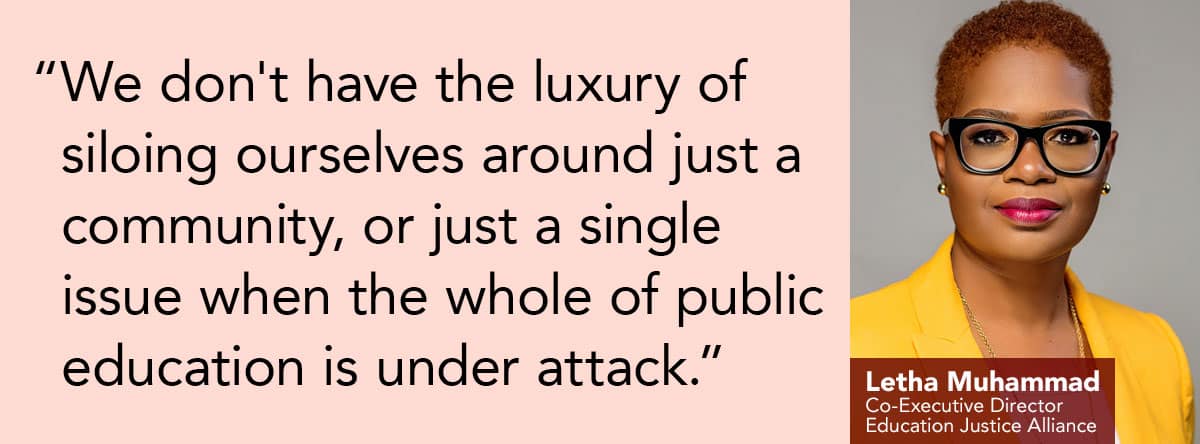
We talked with Letha Muhammad, EJA’s Co-Executive Director, about what she would recommend to others looking to engage with their fellow parents. Here are five things to remember:
1. Meet people where they’re at. Literally and figuratively.
First, EJA regularly knocks on doors and canvasses at public events to meet other parents, start discussions, and educate them on the most pressing issues. This is the bread and butter of grassroots organizing, a task that can change over time but is never done.
And just because those organizers talk to might not agree 100% with EJA doesn’t mean they’re a lost cause, or an adversary. “We don’t have the luxury of siloing ourselves around just a community, or just a single issue,” Letha Muhammad says, “when the whole of public education is under attack.” Public meetings, one-on-one conversations, and member activities are all ways to encourage parents to get involved and learn more.
2. Create conditions for parents to engage.
Make sure childcare is available during meetings. Provide food. Work out which hours work best for your people to attend. Offer interpretation for parents who don’t speak English (learn more about that in our previous Summer School issue). Be consistent: show up when you say you will, even if attendance isn’t what you want it to be.
“At that first meeting you may have just one person, but that doesn’t mean you fold in the towel. It means that you keep going and you recognize that just because people aren’t able to show up all the time, doesn’t speak to people’s willingness to be engaged and or how much they care about a topic. Oftentimes, there are actual barriers that stop people from being engaged. And so if we give up at the first sign of what looks like disinterest, we’re missing out on real opportunities.”
3. Attend school board meetings.
If you haven’t been to one in a while, attend just to listen. Get the lay of the land, better understand the meeting agenda, the regular attendees, and the politics of the school board members.
Once you’re comfortable, step up and speak: not just to make your voice heard to school board members, but also to your fellow attendees and the public watching online. This itself can be a useful networking tactic. Listen to other attendees who get up to speak, too. “If you’re thinking, ‘oh, this actually resonates with me,’ find a way to connect with that person after the meeting,” Letha Muhammad says. “Say ‘hey, I’m interested in seeing if you’re part of an organization, or if we can be connected and come to this space together in the future.’”
4. Be consistent. Be persistent.
We’re all inundated with requests for personal information every moment of the day. When someone actually signs up to get emails, or text alerts, or attend an event, it’s a sign of real interest that should be taken seriously. Follow up with them personally, set up a call, find out what got them motivated.
For events: email, text, and call them in the run-up to let them know how important it is for them to attend.
5. Show up for others and they’ll show up for you.
Helping others is not only the right thing to do, it’s also often the first step to turning those most harmed by injustice into the organizers most effective at remedying it. Look to connect a parent’s individual problem with larger systemic issues in a way that lets them know that they’re not alone, and that together we can solve those problems for countless others.
“A lot of our parents get connected to us through crisis. Their child gets a suspension, or there’s an IEP that didn’t get developed properly. So meeting the needs of parents around those services is another thing that we offer,” she says. “That also then builds trust because they’re now of the mindset, ‘these people show up for me, I’m showing up for them when they ask me to.’”
Further reading and watching
Parent Power — watch this short documentary film that looks behind the scenes at a parent organizing campaign in New York City across fifteen years.
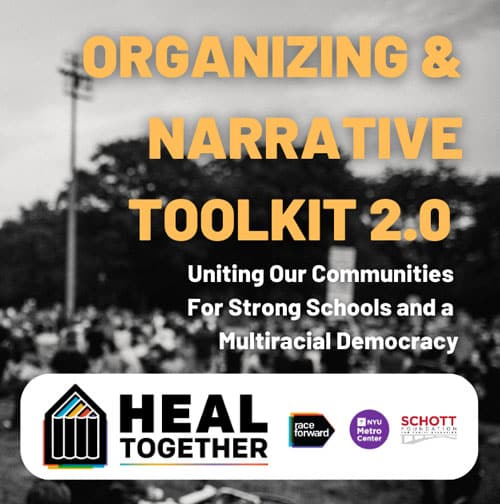
Organizing & Narrative Toolkit — download and use HEAL Together’s latest organizing guide, an extensive toolkit designed to help communities push back against the far right and build power for equity and justice.
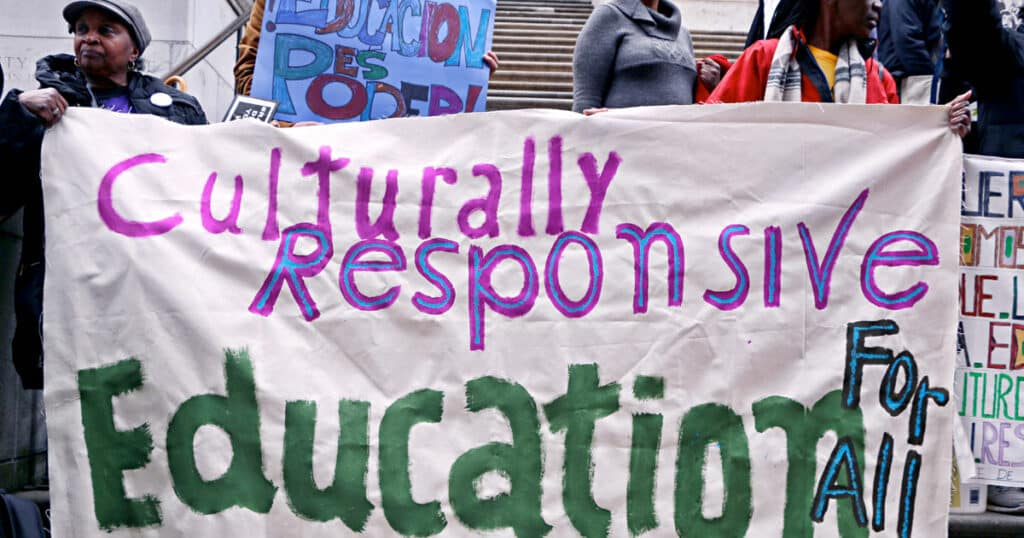
How Parent Organizing Has Shifted Classrooms Toward Racial Justice — read about Schott grantee partner the Coalition for Educational Justice and its parent organizing to improve public school curriculum to be more representative and responsive to its students.

